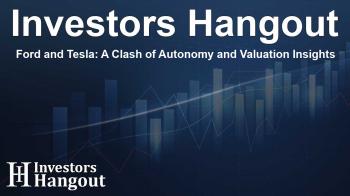Ford and Tesla: A Clash of Autonomy and Valuation Insights

Ford Challenges Tesla’s Valuation Metrics
Ford Motor Co CEO Jim Farley has recently sparked a discussion regarding Tesla Inc's valuation. He expressed skepticism about Tesla's pursuit of fully autonomous vehicles, challenging the broader logic that underpins such a significant investment. During a notable speech at the Aspen Ideas Festival, Farley pointed out the limitations of Tesla's camera-only autonomy approach compared to a more conservative, lidar-based system.
The Safety Narrative: Ford’s Strategic Focus
While Tesla's CEO, Elon Musk, continues to push forward with camera-only robotaxis in select locations, Farley stresses the importance of safety. He emphasizes that lidar technology is essential to ensure consumer trust and safety in autonomous driving. Ford has pivoted its focus towards developing systems that support "eyes-off" driving, signaling a departure from the quest for full autonomy, which Farley describes as unrealistic for the current automotive landscape.
Evaluating Electric Vehicle Valuations
A significant disparity exists in how the market values Tesla compared to traditional automakers like Ford and technology companies like Alphabet Inc. Tesla's market cap is currently pegged at an astounding $1.02 trillion, which leads to a forward P/E ratio that far exceeds that of both Alphabet and Ford. It appears that Tesla's valuation is heavily influenced by optimistic projections regarding autonomous driving.
The Data Tells a Different Story
Analyzing the figures provides insight into these valuations. Tesla’s forward P/E ratio is approximately 163.9x, compared to Alphabet’s 19.1x and Ford’s modest 6.7x. This suggests that Tesla’s share price is premised on assumptions about future revenues from its autonomous driving technology, which experts argue is still in its infancy.
Alphabet: The Hidden Giant
In contrast to Tesla, Alphabet has shown more steady performance and a comprehensive approach to automation through its Waymo subsidiary. Waymo offers a reliable service and continues to gain traction, maintaining over 250,000 paid rides weekly. This business model presents less risk when compared to Tesla’s ambitious yet uncertain pathways.
Ford’s Perspective on Future Technologies
Ford’s perspective on technology adoption aligns closely with consumer safety. By stepping back from the aggressive pursuit of full autonomy, Ford’s strategy appears more grounded. Farley’s insights not only puncture Tesla's optimistic valuation but also highlight a significant reassessment across the automotive industry regarding the feasibility of autonomy in the short term.
The Road Ahead: Realistic Expectations
As Ford champions a more cautious approach, it nudges the industry toward a reality check regarding what autonomy can achieve currently. This could redefine expectations not just for investors, but also for consumers who look for practicality and safety in emerging technologies.
Conclusion: Valuation and Trust in Autonomy
In conclusion, the ongoing debate between Ford and Tesla illustrates a crucial turning point in the automotive industry. While Tesla remains at the forefront of market excitement, Ford’s strategic caution is creating a new narrative about the importance of safety and practicality in technological advancement. Investors may want to reevaluate what they are willing to pay for future promises versus current realities.
Frequently Asked Questions
What is the primary concern of Ford’s CEO regarding Tesla?
Ford's CEO, Jim Farley, questions Tesla's reliance on camera-only systems for autonomy, emphasizing the need for safety through lidar technology.
How does Tesla’s valuation compare to that of Ford?
Tesla's market cap is significantly higher than Ford's, with a forward P/E ratio that far exceeds other traditional automakers.
What insights did Farley provide at the Aspen Ideas Festival?
He shared insights on the importance of consumer safety and realism in technology adoption, advocating for pragmatic approaches over aggressive targets.
How does Alphabet fit into the electric vehicle market?
Alphabet, through Waymo, provides a more established model for autonomy, offering reliable services and a much lower valuation risk compared to Tesla.
What strategic shift is Ford pursuing regarding autonomous driving?
Ford is focusing on developing "eyes-off" driving technology rather than pursuing full autonomy, which aligns better with current safety standards and consumer expectations.
About The Author
Contact Evelyn Baker privately here. Or send an email with ATTN: Evelyn Baker as the subject to contact@investorshangout.com.
About Investors Hangout
Investors Hangout is a leading online stock forum for financial discussion and learning, offering a wide range of free tools and resources. It draws in traders of all levels, who exchange market knowledge, investigate trading tactics, and keep an eye on industry developments in real time. Featuring financial articles, stock message boards, quotes, charts, company profiles, and live news updates. Through cooperative learning and a wealth of informational resources, it helps users from novices creating their first portfolios to experts honing their techniques. Join Investors Hangout today: https://investorshangout.com/
The content of this article is based on factual, publicly available information and does not represent legal, financial, or investment advice. Investors Hangout does not offer financial advice, and the author is not a licensed financial advisor. Consult a qualified advisor before making any financial or investment decisions based on this article. This article should not be considered advice to purchase, sell, or hold any securities or other investments. If any of the material provided here is inaccurate, please contact us for corrections.

